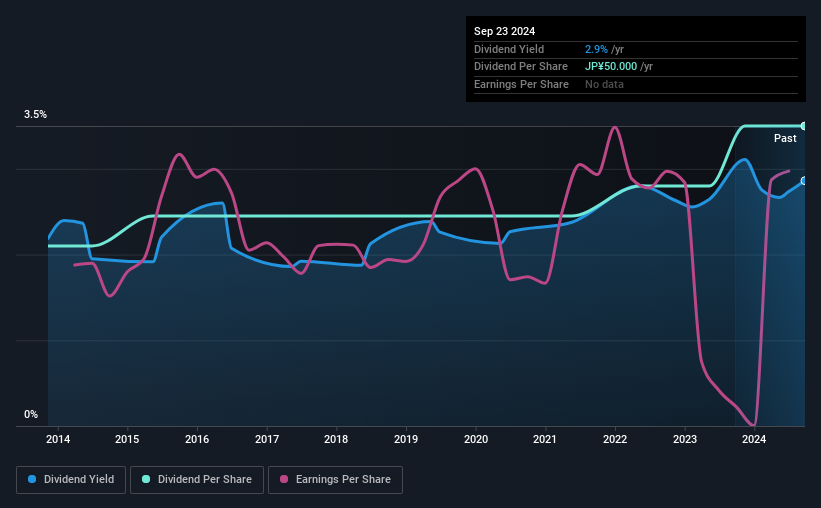The Kiyo Bank, Ltd. (TSE:8370) Passed Our Checks, And It's About To Pay A JP¥25.00 Dividend

Readers hoping to buy The Kiyo Bank, Ltd. (TSE:8370) for its dividend will need to make their move shortly, as the stock is about to trade ex-dividend. The ex-dividend date occurs one day before the record date which is the day on which shareholders need to be on the company's books in order to receive a dividend. The ex-dividend date is of consequence because whenever a stock is bought or sold, the trade takes at least two business day to settle. Meaning, you will need to purchase Kiyo Bank's shares before the 27th of September to receive the dividend, which will be paid on the 5th of December.
The company's upcoming dividend is JP¥25.00 a share, following on from the last 12 months, when the company distributed a total of JP¥50.00 per share to shareholders. Last year's total dividend payments show that Kiyo Bank has a trailing yield of 2.9% on the current share price of JP¥1747.00. Dividends are an important source of income to many shareholders, but the health of the business is crucial to maintaining those dividends. That's why we should always check whether the dividend payments appear sustainable, and if the company is growing.
View our latest analysis for Kiyo Bank
If a company pays out more in dividends than it earned, then the dividend might become unsustainable - hardly an ideal situation. Kiyo Bank has a low and conservative payout ratio of just 21% of its income after tax.
Companies that pay out less in dividends than they earn in profits generally have more sustainable dividends. The lower the payout ratio, the more wiggle room the business has before it could be forced to cut the dividend.
Click here to see how much of its profit Kiyo Bank paid out over the last 12 months.

Have Earnings And Dividends Been Growing?
Companies with consistently growing earnings per share generally make the best dividend stocks, as they usually find it easier to grow dividends per share. Investors love dividends, so if earnings fall and the dividend is reduced, expect a stock to be sold off heavily at the same time. This is why it's a relief to see Kiyo Bank earnings per share are up 7.3% per annum over the last five years.
The main way most investors will assess a company's dividend prospects is by checking the historical rate of dividend growth. Since the start of our data, 10 years ago, Kiyo Bank has lifted its dividend by approximately 5.2% a year on average. It's encouraging to see the company lifting dividends while earnings are growing, suggesting at least some corporate interest in rewarding shareholders.
To Sum It Up
Should investors buy Kiyo Bank for the upcoming dividend? It has been growing its earnings per share somewhat in recent years, although it reinvests more than half its earnings in the business, which could suggest there are some growth projects that have not yet reached fruition. In summary, Kiyo Bank appears to have some promise as a dividend stock, and we'd suggest taking a closer look at it.
While it's tempting to invest in Kiyo Bank for the dividends alone, you should always be mindful of the risks involved. Case in point: We've spotted 1 warning sign for Kiyo Bank you should be aware of.
A common investing mistake is buying the first interesting stock you see. Here you can find a full list of high-yield dividend stocks.
Valuation is complex, but we're here to simplify it.
Discover if Kiyo Bank might be undervalued or overvalued with our detailed analysis, featuring fair value estimates, potential risks, dividends, insider trades, and its financial condition.
Access Free AnalysisHave feedback on this article? Concerned about the content? Get in touch with us directly. Alternatively, email editorial-team (at) simplywallst.com.
This article by Simply Wall St is general in nature. We provide commentary based on historical data and analyst forecasts only using an unbiased methodology and our articles are not intended to be financial advice. It does not constitute a recommendation to buy or sell any stock, and does not take account of your objectives, or your financial situation. We aim to bring you long-term focused analysis driven by fundamental data. Note that our analysis may not factor in the latest price-sensitive company announcements or qualitative material. Simply Wall St has no position in any stocks mentioned.
About TSE:8370
Kiyo Bank
Provides various banking products and services to individuals, corporates, and business customers in Japan.
Good value with proven track record and pays a dividend.


